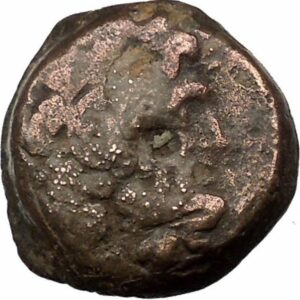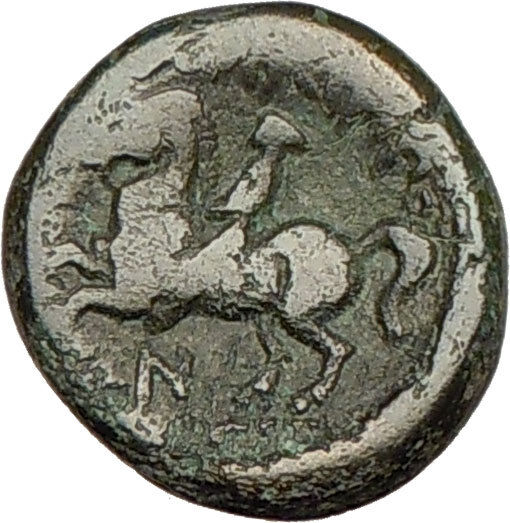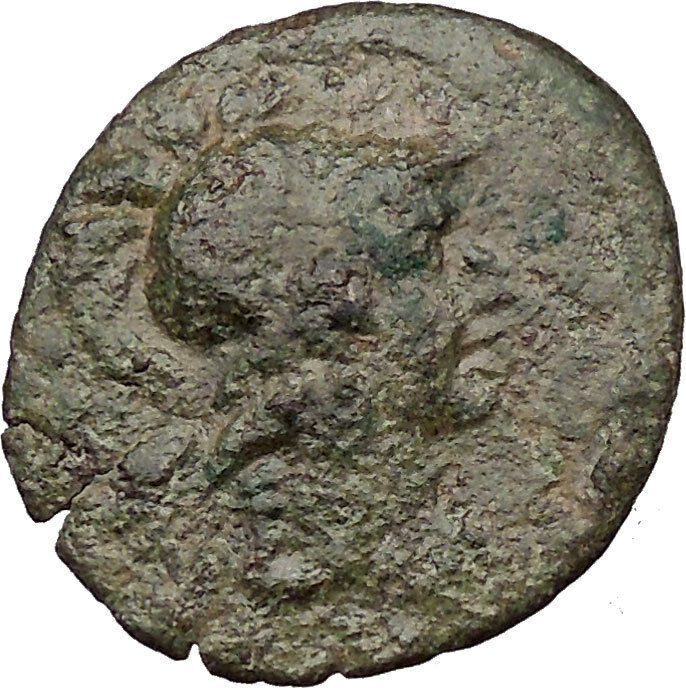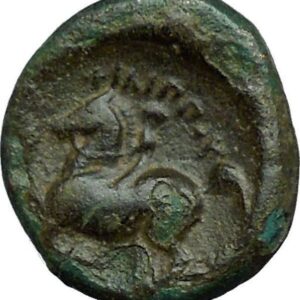|
Greek – Philip III, Arrhidaeus – King of Macedonia: 323-317
B.C.
Bronze ‘Quarter Unit’ 14mm (2.54 grams) Struck circa 323-317 B.C.
Reference: None found, possibly unpublished type.
Head of Alexander the Great as Hercules right, wearing the lion-skin headdress.
Nude athlete on horse prancing right, ΦIΛIΠΠΟΥ above.
* Numismatic Note: What is interesting about this type is that
it borrows motifs from his predecessors, Alexander III the great for the obverse
and Philip II (father of Alexander III the Great) reverse with the nude athlete.
Also it is approximately 20x rarer because of the smaller quarter unit
denomination. May be an unpublished type.
You are bidding on the exact item pictured,
provided with a Certificate of Authenticity and Lifetime Guarantee of
Authenticity.
Alexander III of Macedon, popularly known to history as Alexander
the Great,
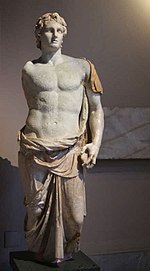
(“Mégas Aléxandros“)
was an
Ancient Greek
king (basileus)
of
Macedon
. Born in 356 BC, Alexander succeeded his father
Philip II of Macedon
to the throne in 336 BC, and died in
Bablyon
in 323 BC at the age of 32.
Alexander was one of the most successful military commanders of all time and
it is presumed that he was undefeated in battle. By the time of his death, he
had conquered the
Achaemenid Persian Empire
, adding it to Macedon’s European territories;
according to some modern writers, this was much of the world then known to the
ancient Greeks (the ‘Ecumene‘).
His father, Philip, had unified most of the
city-states
of mainland Greece under Macedonian
hegemony
in
the
League of Corinth
. As well as inheriting hegemony over the Greeks, Alexander
also inherited the Greeks’ long-running feud with the
Achaemenid Empire
of
Persia
. After reconfirming Macedonian rule by quashing a rebellion of
southern Greek city-states, Alexander launched a short but successful campaign
against Macedon’s northern neighbours. He was then able to turn his attention
towards the east and the Persians. In a
series of campaigns
lasting 10 years, Alexander’s armies repeatedly defeated
the Persians in battle, in the process conquering the entirety of the Empire. He
then, following his desire to reach the ‘ends of the world and the Great Outer
Sea’, invaded India, but was eventually forced to turn back by the near-mutiny
of his troops.
Alexander died after twelve years of constant military campaigning, possibly
a result of malaria
, poisoning
,
typhoid fever
, viral
encephalitis
or the consequences of alcoholism. His legacy and conquests
lived on long after him and ushered in centuries of Greek settlement and
cultural influence over distant areas. This period is known as the
Hellenistic period
, which featured a combination of
Greek
,
Middle
Eastern
and
Indian culture
. Alexander himself featured prominently in the history and
myth of both Greek and non-Greek cultures. His exploits inspired a literary
tradition in which he appeared as a legendary
hero in the
tradition of Achilles
.

Alexander fighting Persian king Darius III. From Alexander
Mosaic, from Pompeii, Naples, Naples National
Philip III Arrhidaeus (Greek; ca. 359
BC – December 25, 317 BC) was the king of
Macedon
from after June 11, 323 BC until his death. He was a son of King
Philip
II of Macedon
by Philinna of
Larissa
,
allegedly a Thessalian
dancer, and a half-brother of
Alexander
the Great
. Named Arrhidaeus at birth, he assumed the name Philip when
he ascended to the throne.
In Plutarch
‘s
report, he became both physically and mentally disabled following a poisoning
attempt by Philip II’s wife, Queen
Olympias
,
who wanted to eliminate a possible rival to her son Alexander. However, this may
just be malicious gossip, and there is no evidence that Olympias really caused
her stepson’s condition. Alexander was very fond of him, and took him on his
campaigns, both to protect his life and to ensure he would not be used as a pawn
in a challenge for the throne. After Alexander’s death in Babylon, Arrhidaeus
was proclaimed king by the Macedonian army in Asia. However, he was a mere
figurehead, and a pawn of the powerful generals, one after the other. His reign
and his life did not last long.
The crater
Ariadaeus
on the Moon
is named after him.
[
Biography
He appears to have never been a danger for Alexander’s succession to Philip
II, notwithstanding their being of about the same age; all the same, when the
satrap
of
Caria
Pixodarus
proposed his daughter in marriage to Philip, who offered Arrhidaeus as husband,
Alexander thought it prudent to block the operation, with considerable
irritation of his father (337 BC). Arrhidaeus’ whereabouts under the reign of
his brother Alexander are unclear; what is certain is that no civil or military
command was given him in those thirteen years (336 BC–323 BC).
He was at Babylon
at the time of Alexander’s death, the 11 June 323 BC. A succession
crisis erupted: Arrhidaeus was the most obvious candidate, but he was mentally
unfit to rule. A conflict exploded between
Perdiccas
,
leader of the
cavalry
, and
Meleager
, who commanded the
phalanx
:
the first wanted to wait to see if
Roxana
,
Alexander’s pregnant wife, would deliver a male baby, while the second objected
that Arrhidaeus was the closest relative living and so should be chosen king.
Meleager was killed, and a compromise was engineered: Arrhidaeus would become
king with the name of Philip, and he would be joined by Roxana’s son as
co-sovereign should he prove a male, as he did, and joined his uncle with the
name of
Alexander
. It was immediately decided that Philip Arrhidaeus would reign,
but not rule: this was to be the prerogative of the new
regent
,
Perdiccas.
When news arrived in Macedon that Arrhidaeus had been chosen as king,
Cynane
, a
daughter of Philip II, matured the design to travel to Asia and offer the new
king her daughter
Eurydice
for wife. This move was an obvious affront to the regent, whom
Cynane had completely bypassed: to prevent the move Perdiccas sent his brother
Alcetas
to
kill Cynane, but reactions among the troops generated by this murder was such
that the regent had to give up and accept the marriage. From that moment on
Philip Arrhidaeus was to be under the sway of his bride, a proud and determined
woman bent on substantiating her husband’s power.
Eurydice’s chance came when the first war of the
Diadochi
sealed the fate of Perdiccas, making a new settlement necessary; settlement that
was made at
Triparadisus
in Syria
in 320 BC. Eurydice moved deftly enough to obtain the removal of the
first two designed regents,
Peithon
and
Arrhidaeus
,
but was powerless to block the too powerful
Antipater
:
the latter was made new regent and Philip Arrhidaeus and his wife were forced to
follow him to Macedon.
The regent died of natural causes the following year, nominating as his
successor not his son
Cassander
,
but a friend of his,
Polyperchon
. Cassander’s refusal to accept his father’s decision sparked the
second war of the Diadochi, in which Eurydice saw once again a chance to free
Philip from the control of the regent. An opportunity presented itself in 317
BC, when Cassander expelled Polyperchon from Macedon: Eurydice immediately
allied herself with him and made her husband nominate him new regent, and
Cassander reciprocated by leaving her in full control of the country when he
left to campaign in
Greece
.
But all this was to prove exceedingly volatile: that same year (317)
Polyperchon and Olympias, allied with the king of
Epirus
Aeacides
,
invaded Macedon, while the Macedonian troops refused to fight the son of
Alexander, whom the invaders had brought with them. Philip and Eurydice had no
choice but to escape, only to be captured at
Amphipolis
and thrown into prison. It soon became clear that Philip was too dangerous to be
left alive, as many enemies of Olympias saw him as a useful tool against her,
and so on December 25 317 BC she had him executed, while his wife was forced to
commit suicide.
The following year, when Cassander reconquered Macedon and avenged Philip’s
death, he interred the bodies of Philip and Eurydice with royal pomp at
Aegae
, and
celebrated funeral games to their honour.
In 1977 important excavations were made near Vergina leading to the discovery
of a two-chambered royal tomb, with an almost perfectly conserved male skeleton.
Manolis
Andronikos
, the chief archaeologist on the ground and the majority of
archaeologists, decided it was the skeleton of Philip II, but many have disputed
this attribution and instead proposed it to be the remains of Philip Arrhidaeus.
Subsequent forensic reconstruction of the skull contained in the gold Larnax
(cremains container) clearly demonstrates damage to the right eye socket of the
skull in keeping with historical accounts that Philip II had been struck by an
arrow in the right eye and as a consequence, had been severely disfigured. See
Prag, John and Richard Neave: Making Faces: Using Forensic and Archaelogical
Evidence (British Museum Press: 1997).
|






